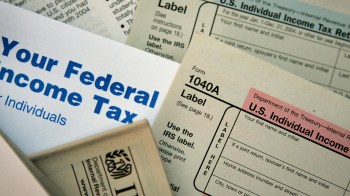Illinois citizens feel squeezed by state tax hikes
Tess Vigeland: Many states are looking for ways to close budget deficits. Most, if not all, are trying to cut spending. And some are considering tax increases. Earlier this year, Illinois raised its personal income tax from 3 to 5 percent.
Tony Arnold met up with one resident at a suburban Chicago coffee shop to explore how personal budgets are being affected by the hike.
Tony Arnold: Heidi Kronenberg is one of about six million Illinois residents who pony up for the state’s income tax every pay period.
She’s a mother of two and makes $63,000 a year — just about 10 percent above the Illinois median wage. And she’s been paying an extra $85 a month in taxes since the beginning of the year.
Heidi Kronenberg: And so you look at this and it’s your pay increase, if you’re getting a cost of living increase, that they just took away. It’s kind of significant.
Arnold: How much do you watch your income?
Kronenberg: I watch it pretty closely. That’s your gas bill or your gas and electric bill that all of a sudden is just gone. I definitely feel it.
Over the course of 2011, Kronenberg will pay about $1,400 more in state income taxes than last year. Illinois legislators passed the increase in January. It’s meant to help cut a $13 billion deficit, one of the country’s worst among state governments.
Kronenberg: I understand we’re in a huge amount of debt. Having, such a high tax increase doesn’t really sit very well.
The move left Kronenberg wondering where all her tax dollars go in the first place.
Kronenberg: I’m willing to pay the money. But it would be nice if I could see it going into effect also.
Governor Pat Quinn proposed a $52-billion spending plan for the upcoming budget year. Legislators are putting the finishing touches on their own version. But to give Kronenberg a sense of the state’s funding priorities, I showed her a pie chart of Quinn’s proposal.
Kronenberg: So it says 48.2 percent for human services.
Health care, child care and services for veterans and the poor.
Kronenberg: 35.5 percent for education. 9.6 for government. That’s good. Six for public safety and regulation, which includes prisons. Economic development: .4 percent, quality of life .3 percent. So that’s pretty low for quality of life. But at least education is 35.5 and human services is 48.2.
Both of Kronenberg’s two kids go to public school. Funding for K-12 is largely intact in current budget outlines. But she cringes at proposed reductions to higher education. Some cuts are likely. The income tax increase might not even erase half the state’s red ink.
Arnold: Do you think the state should try to raise more revenue? Work with a bigger pot?
Kronenberg: Yeah. But not from me. Maybe, the federal government.
In Chicago, I’m Tony Arnold for Marketplace Money.
There’s a lot happening in the world. Through it all, Marketplace is here for you.
You rely on Marketplace to break down the world’s events and tell you how it affects you in a fact-based, approachable way. We rely on your financial support to keep making that possible.
Your donation today powers the independent journalism that you rely on. For just $5/month, you can help sustain Marketplace so we can keep reporting on the things that matter to you.


















